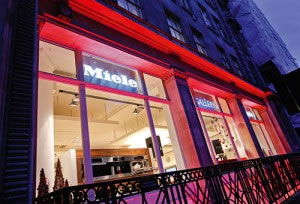The market is in a really great place
Miele’s steady growth and partnership-building approach may not be as dramatic as its competitors’ but, as managing director Simon Grantham tells Andrew Davies, don’t underestimate the quiet ones
As anyone familiar with Miele will know, the head office in Abingdon, Oxfordshire, includes the grandly titled Experience Centre, a name that, one imagines, forces the long-suffering receptionist to smile professionally when waggish visitors stride in and joke that they’ve come to “pick up their experience”.
The centre is actually a hugely impressive two-storey showroom that provides the kind of space for training and live cookery events that smaller competitors can only dream of. As you would expect from one of the industry’s premium brands, there are no half measures.
And with another successful period of growth under his belt, managing director Simon Grantham is celebrating 10 years at the Miele helm. He looks relaxed as he poses for the kbbreview photographer, adopting that familiar casual lean that all senior executives must seemingly be taught at business school.
Not only has he steered the Miele ship steadily through a series of product launches that have led to both double-digit growth and new records for turnover, Grantham has also just signed up to be the new chairman of the appliance industry association, Amdea.

“Globally, it’s the strongest year the company has had since 2005,” he explains. “There are lots of factors that have led to that – improving economies around the world, for instance – but the main reason is that we have launched an awful lot of products over the past two years. In the UK, ever since we came out of recession and consumer confidence improved, we have experienced significant growth.”
This view is slightly at odds with the opinion held by Sean O’Driscoll. The Glen Dimplex chief executive recently told kbbreview that the white-goods market was “very, very difficult” and was suffering from “massive price deflation”. Is the polarisation between the mid- and premium markets really that pronounced?
“Definitely,” Grantham asserts. “You’ve got a lot of volume growth at the lower price points but, fortunately, that’s not where Miele operates. You are seeing strong growth at the premium end of all the main categories – and that includes freestanding, too.”
He continues: “If you take washing machines as an example, I recently saw one advertised for £149. Our best-selling model retails for £1,100. There is a customer at the top end of the market who wants the performance that goes with that. I think the market is in a really great place and I don’t think it’s poor at all.”
As well as product development, there has also been a significant investment in the brand’s marketing activities – Grantham says the spend has doubled – including straight advertising as well as in-store displays for retail partners and, towards the end of March, a complete refit for the Miele Gallery showroom in central London.
While this marketing spend has undoubtedly increased, much of it has gone towards a clear strategy of developing face-to-face relationships with both retailers and, ultimately, consumers. This is particularly the case for the built-in cooking ranges. Miele’s approach is not to plaster the brand over as many items as possible, which perhaps explains why the brand does not appear to be as overtly flashy as some of its competitors.
Right now, there is a huge number of consumers who want the personal service that only independent retailers can provide and we will do whatever we can to support them
For example, back in September, Miele announced the launch of its Taste For Design consultations, which replaced and built upon on the successful
Let’s Do Lunch programme that had run for several years. The scheme enables retailers to send their clients to the Experience Centre or the Gallery for half a day, where they can use the appliances and see them demonstrated by home economists. The company says nine out of 10 people who attend end up upgrading their orders.
“Building relationships is definitely the strategy for our cooking business, where people are often in a three-month project deciding on their kitchen. Part of that process is learning about the appliances and that’s where you can give a personal, almost hand-holding, service,” says Grantham.
“We’ve found that the best form of marketing we have is when our customers become advocates. When they refer us and talk happily about the quality, it’s very successful. We are now going to take that a stage further with a new VIP programme for our top kitchen partners that we’re rolling out in the spring.”
In-depth consultations
There is a possible downside to this approach, of course. Some retailers complain, perhaps legitimately, that customers with a fixed budget may end up upgrading their appliances at the cost of the furniture – and, ultimately, retailers make more margin on furniture than appliances.
“I am familiar with that point of view, of course,” Grantham says. “But I think it’s a quite a complex discussion. Where I’ve seen it work particularly well is with kitchen partners, who have a good relationship with our showroom. The customer comes to us when they’ve already had a long discussion with the kitchen designer and they’re well on the way to choosing the final specification. In their minds, they usually have a budget for appliances. Our staff then consult and work with them around that list.
“What we find is that we get a very positive customer response if you tell them about the features and benefits that they didn’t know about. That may change the specification but, wherever
possible, we work with the kitchen specialist to facilitate that.”
One aspect of the “relationship” approach to retailers – or “retail partners” as Grantham frequently refers to them – is the idea that by working more closely with fewer of them, the supplier can end up with more business.

“It’s interesting because when we went into the recession, quite a number of electrical retailers and kitchen specialists left the market,” he says. “However, a lot of new kitchen studios, in particular, have come back in and we’ve had a lot of new applications to open accounts in the past couple of years, which has been really positive. I actually think that will probably continue.”
An opinion often voiced by independent retailers is that they don’t get enough support from the large brands. But is that something that people in Grantham’s position should feel obliged to provide? Especially if it bears no relation to the comparative level of business that retailer is doing? “Ultimately,” he says, choosing his words carefully, “you want to follow the customer and try to predict where they are going. Right now, there’s a huge number of consumers that want the personal service that only independent retailers can provide and, where that exists, we’re in total agreement with them and will do whatever we can to support those retailers.
“At the end of the day, though, we are driven by commercial decisions. If the retailer and
Miele can’t make money out of it, there’s no point doing it.”
Whirlpool’s woes have made headlines recently in relation to the massive amount of work the company is having to do to put right a fault in its Hotpoint, Indesit and Creda tumble dryers.
This coincides with Grantham’s acceptance of the Amdea chairmanship and, for him, it underlines the importance of one of the organisation’s main initiatives. Register My Appliance was set up to encourage consumers to register their ownership of any new product so they can keep up to date with relevant safety information.
“Register My Appliance has, in my view, been the most powerful initiative that Amdea has done over the past three or four years and, actually, the success is there in the numbers,” he says. “There are 60 brands that have it on their website, encouraging consumers to do it, and there has been a huge take-up. It’s about getting the message out that there are nothing but advantages in registering that new appliance and it’s a good example of an initiative that has united a quite diverse and very competitive industry.”
Grantham recently celebrated a decade with Miele and, after that amount of time, the characteristics of the boss tend to rub off on the company. In person, Grantham comes across as calm, collected and unflappable and it’s fair to say that Miele UK can be seen in a similar light.
That approach belies a strong commitment to implementing the product development programme that is coming from Germany and finding new ways to invest in the brand and its relationship with retailers and consumers. Miele may not be flash but it’s always the quiet ones you need to look out for.